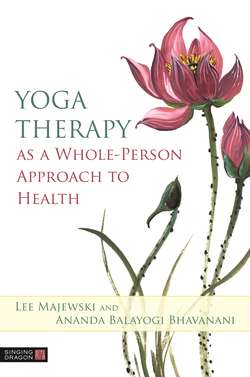Читать книгу Yoga Therapy as a Whole-Person Approach to Health - Lee Majewski - Страница 58
На сайте Литреса книга снята с продажи.
Understanding the issues that brought the client to us
ОглавлениеIn order to properly understand the client and their problem, we need to make sure that we keep our ego in check and that we are conscious of any projections or transference that may occur as the result of our own experiences. Our own history affects our judgment and we need to be very aware of this fact in order to prevent mis-assessment. Very often we have “blind spots” around our own issues, and it is always good to have some kind of supervision set up to be able to verify our own projections getting in the way of assessment.
In Lee’s case this manifested in a peculiar way. She noticed that after finishing a three-week intensive retreat, Beyond Cancer, she would be completely depleted of energy and had to spend two to three days resting in bed to slowly regain her vitality. One day she was discussing the retreat with a friend—a yogi scholar and psychotherapist—and she mentioned her affliction. He listened carefully and then said, “Most likely you have unresolved issues around the work you are doing with cancer patients.” It took only a second to realize that she had never grieved the death of her father from lung cancer when she was 15. That night she let it all surface and had a deep release. Since then she tends to be tired, which is to be expected after leading three weeks of an intensive retreat, but never so depleted as before.
Here are a few suggested check points for yoga therapists before they face a client:
A SUGGESTED PERSONAL CHECKLIST FOR YOGA THERAPISTS
1. Do not bring your personal problems into the assessment process.
2. Let go of your prejudices and do not let that influence the assessment.
3. Patience and perseverance are key qualities if you are to do justice to the assessment process.
4. Intelligence and empathy guide an objective and logical assessment.
5. Do not judge the client, and never condemn them for choices they may have made. Remember, it is their life!
6. Always remember that your role is limited to facilitating their inherent healing mechanisms and not to impose your will on them.
7. This should be a bidirectional interactive process and their choices should be accepted and respected, even if they are contrary to your own personal views.
For the purpose of assessment it is always useful to use the five-layered existential model (pancha kosha) as it enables us to develop a thorough understanding through processes of observation (darshanam), touch (sparshanam), detailed interview (prasnam), and assessment of energy flows (nadi pariksha) the issues that may be of a physical, functional, psychological, intellectual (frustrations and conflicts), or even spiritual nature.
